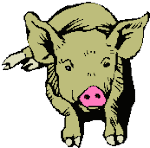When the Chinese invite poets to tea, and the British stalk, harass and threaten witnesses to Parliament at Westminster, and for more than a decade, there is something decidedly sinister about Porcine Circovirus.
Porcine Circovirus seems to bring out the worst in terrified officials and those that depend on their largesse.
Ironically, the senior ranks of the British Civil Service have long been nicknamed "Mandarins." They certainly behave like Mandarins.
The full Guardian report is here
Rivers of blood: the dead pigs rotting in China's water supply
Shanghai's drinking water is under threat after 16,000 diseased pig carcasses are found in tributaries of the Huangpu river
Nicola Davison in Jiaxing, Friday 29 March 2013
Over the weeks since the discovery of 16,000 pig carcasses in Shanghai's water supply, authorities have consistently worked to quell public outcry, reiterating that drinking water is safe. While there have been reports and discussion of the incident in state media and on the country's rollicking microblog network, which is curtailed by censors, attempts to organise protests have been swiftly quashed.
Pan Ting, an outspoken Shanghainese poet, was detained for questioning by police after she posted a call for a mass walk along the Huangpu, the city's central river, on her Sina Weibo account. The post, which went out to her 50,000 followers on 14 March, called for a "pure stroll" without banners or slogans. Soon afterwards she was asked to "drink tea" with the police – an idiom used to describe interrogations. On her other Weibo account she later posted: "I feel very disappointed. You even shut out a voice concerned about local pollution and your own lives. I will see how long you will shut me out. At least uncle tea said to me: I understand where you are coming from."
As news about Pan's detention spread through Weibo, prominent users voiced support. "Just because a young woman said a few honest words about the dead pig issue, she was detained, banned and forced to hand in all of her communication devices," said Li Minsheng, a well-known writer. "She was even 'missing' for three hours! Her only request was: 'Please do not come ring my doorbell early in the morning or in the middle of the night to scare my mum.' As a big city that has hosted the World Expo, why can't Shanghai tolerate a poet? What law has Pan Ting violated? Please respond to the whole nation, Shanghai!"
Additional reporting: Xia Keyu.
